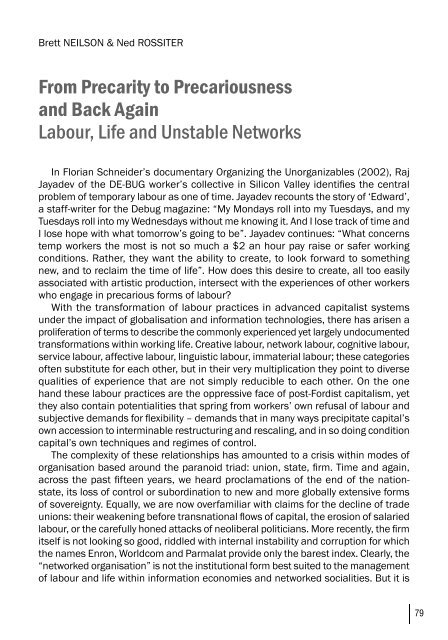art-e-conomy _ reader - marko stamenkovic
art-e-conomy _ reader - marko stamenkovic
art-e-conomy _ reader - marko stamenkovic
Create successful ePaper yourself
Turn your PDF publications into a flip-book with our unique Google optimized e-Paper software.
Brett NEILSON & Ned ROSSITER<br />
From Precarity to Precariousness<br />
and Back Again<br />
Labour, Life and Unstable Networks<br />
In Florian Schneider’s documentary Organizing the Unorganizables (2002), Raj<br />
Jayadev of the DE-BUG worker’s collective in Silicon Valley identifies the central<br />
problem of temporary labour as one of time. Jayadev recounts the story of ‘Edward’,<br />
a staff-writer for the Debug magazine: “My Mondays roll into my Tuesdays, and my<br />
Tuesdays roll into my Wednesdays without me knowing it. And I lose track of time and<br />
I lose hope with what tomorrow’s going to be”. Jayadev continues: “What concerns<br />
temp workers the most is not so much a $2 an hour pay raise or safer working<br />
conditions. Rather, they want the ability to create, to look forward to something<br />
new, and to reclaim the time of life”. How does this desire to create, all too easily<br />
associated with <strong>art</strong>istic production, intersect with the experiences of other workers<br />
who engage in precarious forms of labour?<br />
With the transformation of labour practices in advanced capitalist systems<br />
under the impact of globalisation and information technologies, there has arisen a<br />
proliferation of terms to describe the commonly experienced yet largely undocumented<br />
transformations within working life. Creative labour, network labour, cognitive labour,<br />
service labour, affective labour, linguistic labour, immaterial labour; these categories<br />
often substitute for each other, but in their very multiplication they point to diverse<br />
qualities of experience that are not simply reducible to each other. On the one<br />
hand these labour practices are the oppressive face of post-Fordist capitalism, yet<br />
they also contain potentialities that spring from workers’ own refusal of labour and<br />
subjective demands for flexibility – demands that in many ways precipitate capital’s<br />
own accession to interminable restructuring and rescaling, and in so doing condition<br />
capital’s own techniques and regimes of control.<br />
The complexity of these relationships has amounted to a crisis within modes of<br />
organisation based around the paranoid triad: union, state, firm. Time and again,<br />
across the past fifteen years, we heard proclamations of the end of the nationstate,<br />
its loss of control or subordination to new and more globally extensive forms<br />
of sovereignty. Equally, we are now overfamiliar with claims for the decline of trade<br />
unions: their weakening before transnational flows of capital, the erosion of salaried<br />
labour, or the carefully honed attacks of neoliberal politicians. More recently, the firm<br />
itself is not looking so good, riddled with internal instability and corruption for which<br />
the names Enron, Worldcom and Parmalat provide only the barest index. Clearly, the<br />
“networked organisation” is not the institutional form best suited to the management<br />
of labour and life within information economies and networked socialities. But it is<br />
79


